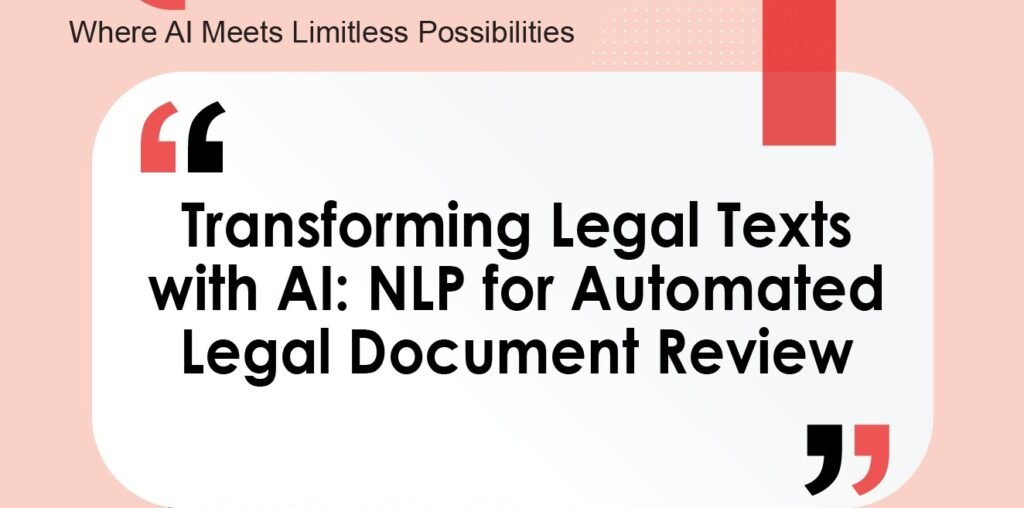In recent years, the legal profession has witnessed a seismic shift with the advent of artificial intelligence (AI) technologies, particularly in the realm of natural language processing (NLP). This transformation is redefining how legal documents are reviewed, analyzed, and managed, offering unprecedented efficiency and accuracy. The integration of NLP into legal document review is not just a technological innovation but a fundamental change that promises to enhance the practice of law by streamlining tasks and reducing the burden on legal professionals.
Understanding NLP and Its Role in Legal Tech
Natural Language Processing, a subset of AI, is concerned with the interaction between computers and human language. It enables machines to understand, interpret, and generate human language in a way that is both meaningful and contextually relevant. In the context of legal texts, NLP algorithms are designed to parse through complex language, identify key concepts, and make sense of the vast amounts of data contained within legal documents.
Legal documents are notoriously dense and complex, often filled with jargon, nuanced terms, and intricate sentence structures. Traditional document review processes can be time-consuming and prone to human error. NLP technology addresses these challenges by automating the review process, significantly reducing the time and effort required to sift through large volumes of text.
Automated Document Review: Efficiency Meets Accuracy
One of the most significant advantages of NLP in legal document review is its ability to enhance efficiency. In legal practice, the review of documents such as contracts, briefs, and case law can be labor-intensive. Traditionally, this involves manual reading and analysis, a process that can be slow and costly. NLP-powered tools can expedite this process by quickly scanning and analyzing documents to identify relevant information.
For example, contract review is a common task where NLP excels. AI-driven systems can be trained to recognize key contract clauses, flag potential issues, and suggest modifications. These tools not only speed up the review process but also reduce the risk of missing critical details that could have significant legal implications.
Moreover, NLP algorithms can identify patterns and correlations within large datasets that might not be immediately apparent to human reviewers. This capability is particularly valuable in legal research and due diligence, where finding relevant precedents or uncovering hidden relationships between documents can make a substantial difference in case outcomes.
Improving Accuracy and Reducing Bias
In addition to enhancing efficiency, NLP tools contribute to improved accuracy in legal document review. By leveraging machine learning techniques, these systems can be trained on vast amounts of legal text to develop a deep understanding of legal language and concepts. As a result, they can provide more consistent and precise analyses compared to manual reviews, which are susceptible to human error and oversight.
Another critical benefit of NLP is its potential to reduce bias. Human reviewers, despite their best efforts, may unintentionally bring personal biases into their analyses. NLP systems, on the other hand, operate based on data-driven algorithms, minimizing the impact of subjective judgments. This can lead to fairer and more objective assessments of legal documents.
Challenges and Considerations
Despite its many advantages, the integration of NLP into legal document review is not without challenges. One significant hurdle is the need for high-quality training data. NLP systems require extensive and well-annotated datasets to perform accurately. In the legal field, this means compiling a diverse range of legal texts to train models effectively.
Additionally, while NLP can handle many aspects of document review, it is not infallible. Legal texts often involve subtleties and ambiguities that may pose difficulties for AI systems. Human oversight remains crucial to ensure that the nuances of legal language are fully understood and interpreted correctly.
Ethical considerations also play a role in the adoption of NLP technologies. Data privacy and security are paramount, especially when dealing with sensitive legal information. Ensuring that NLP tools comply with legal and ethical standards is essential to maintaining trust in these technologies.
The Future of Legal Document Review
Looking ahead, the role of NLP in legal document review is poised to expand further. Advances in AI and machine learning will continue to enhance the capabilities of NLP tools, making them even more effective at understanding and analyzing complex legal texts. As these technologies evolve, they hold the potential to transform not just document review but the broader legal landscape.
In conclusion, the integration of NLP into legal document review represents a significant advancement in the legal profession. By automating tedious and error-prone tasks, NLP technologies are enabling legal professionals to work more efficiently and accurately. While challenges remain, the benefits of NLP in improving document review processes are clear. As technology continues to advance, the future of legal document review will undoubtedly be shaped by these innovative AI-driven solutions, driving greater efficiency and precision in the practice of law.

